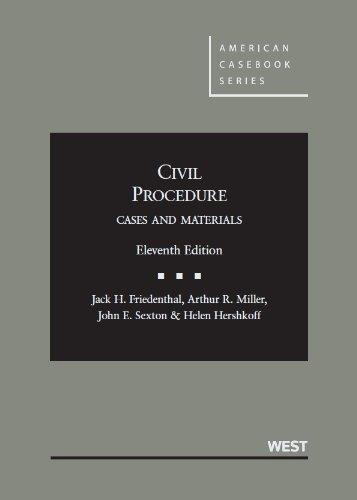8. Professor Ely, who served as a law clerk to Chief Justice Warren the term that Hanna...
Question:
8. Professor Ely, who served as a law clerk to Chief Justice Warren the term that Hanna was decided, has emphasized the distinct analytic questions that a federal court must consider when faced with a federal-state choice of law question:
* * * [T]he indiscriminate admixture of all questions respecting choices between federal and state law in diversity cases, under the single rubric of “the Erie doctrine” or “the Erie problem,” has served to make a major mystery out of what are really three distinct and rather ordinary problems of statutory and constitutional interpretation. Of course there will be occasions with respect to all three on which reasonable persons will differ, but that does not make the problems mysterious or even very unusual. The United States Constitution, I shall argue, constitutes the relevant text only where Congress has passed a statute creating law for diversity actions, and it is in this situation alone that Hanna’s“arguably procedural” test controls. Where a nonstatutory rule is involved, the Constitution necessarily remains in the background, but it is functionally irrelevant because the applicable statutes are significantly more protective of the prerogatives of state law. Thus, where there is no relevant Federal Rule of Civil Procedure or other Rule promulgated pursuant to the Enabling Act and the federal rule in issue is therefore wholly judgemade, whether state or federal law should be applied is controlled by the Rules of Decision Act, the statute construed in Erie and York. Where the433matter in issue is covered by a Federal Rule, however, the Enabling Act and not the Rules of Decision Act itself or the line of cases construing it constitutes the relevant standard. To say that, however, and that is one of the things Hanna said, is by no means to concede the validity of all Federal Rules, for the Enabling Act contains significant limiting language of its own.
The Court has correctly sensed that that language cannot be construed to protect state prerogatives as strenuously as the Rules of Decision Act protects them in the absence of a Federal Rule. However, the Court’s recent appreciation that the Enabling Act constitutes the only check on the Rules that “Erie” does not stand there as a backstop should lead it in an appropriate case to take the Act’s limiting language more seriously than it has in the past.
Ely, The Irrepressible Myth of Erie, 87 Harv. L. Rev. 693, 697–98 (1974). In the cases that follow, consider whether “in an appropriate case” the Court has taken the language of 28 U.S.C. § 2072
(b) “more seriously than it has in the past.”
Step by Step Answer:

Civil Procedure Cases And Materials
ISBN: 9780314280169
11th Edition
Authors: Jack Friedenthal, Arthur Miller, John Sexton, Helen Hershkoff






